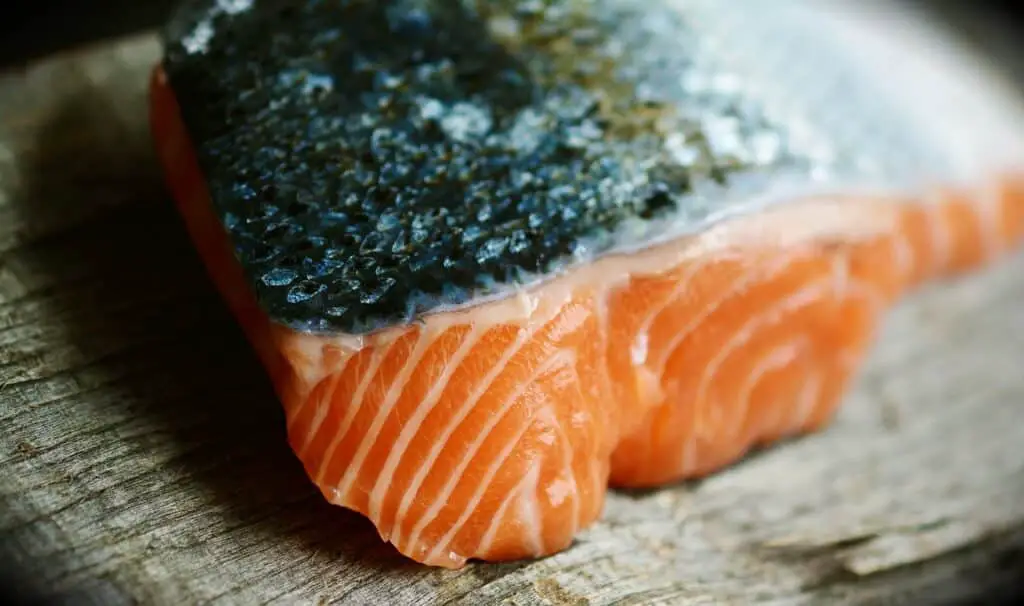Let’s face it; dogs aren’t picky eaters, especially when it comes to meat.
Therefore, it’s up to the dog owner to feed them what’s safe and in moderation.
Since most dog food contains fish, you may be tempted to introduce salmon skin as a regular dish, but it’s not recommended.
So, can dogs eat salmon skin?
Yes.
Salmon skin is nutritiously packed with Omega 3 fats and protein, beneficial for your dog’s health.
Ensure it’s fully cooked with no added flavors or seasonings, and feed your dog sparingly.
Before adding salmon skin to your dog’s balanced diet, understand the risks, nutritional value, and the safest ways to feed them.

How to cook salmon skin for dogs
- Preparing salmon skin at home is simple. You need fresh boneless salmon fillets only. Either steam, boil, grill or bake but don’t add seasonings.
- Choose fresh fish. Ensure it’s properly cleaned and completely deboned.
- Whether grilling, broiling, steaming or roasting the fish, ensure it’s thoroughly cooked. Undercooked salmon skin can cause salmonellosis, which manifests as stomach upset, vomiting and diarrhea in dogs.
- Do not add any seasonings. Most spices in your kitchen pantry are toxic to dogs and better avoided.
- Boneless fillets make great treats for dogs and are full of proteins and essential oils.
Health benefits of salmon skin treat for dogs
Fish has excellent health benefits for you and your dog.
Adequately prepared, it’s an excellent addition to your dog’s balanced diet.
Salmon skin is rich in proteins, omega 3 fatty acids, vitamins and minerals with the following benefits to your dog;
- Healthy coat and skin
- Improves skin allergies and irritations
- Improved brain functioning
- Boosts immune system
- Minimizes joint inflammation
- Proper neural development
Salmon skin and dog’s dental health
Chewing healthy jerky salmon skin is a great way to improve your dog’s dental health.
Gum disease is prevalent in dogs due to the lack of brushing and the alkaline environment in the dog’s mouth contributing to plaque formation.
This plaque is easily removed by chewing.
However, Salmon skin is a perfect treat that offers nutritional benefits while improving the dental care of dogs.

Can salmon skin cause poisoning in dogs?
Salmon has parasites that can cause poisoning. Salmon poisoning symptoms include;
- Vomiting
- Decreased appetite
- Diarrhea
- Fever
- Dehydration
- Swollen lymph nodes
Risks of feeding salmon skin to your dogs
When introducing salmon skin to your dog’s diet, acquaint yourself with the associated dangers and know how to avoid them.
Before feeding your furry friend, most risks are prevented by cooking the salmon skin adequately.
Some of the risks are;
- The presence of thiaminase and Vitamin B1 make it challenging for dogs to digest the salmon skin.
- Canned salmon contains preservatives unsafe for dogs
- Increased risk for bacteria like salmonella and listeria in raw or undercooked salmon skin
- High sodium concentration is a threat to dogs
- Salmon skin contains high pollutants, toxins, and heavy metals like mercury. Mercury poisoning manifests as blood vomits, diarrhea, loss of coordination and kidney damage.
How to safely feed salmon skin to your dog
Avoid raw salmon skin – Most rainwater fish have parasites and bacteria dangerous to dogs. The symptoms of bacterial infection include loss of appetite, lethargy and weight loss. Ensure the salmon skin is fully cooked to kill these parasites and bacteria. Likewise, remove the hard scales to avoid scratching your dog’s throat.
Avoid additives and flavorings – Salmon skin prepared for dogs needs to be free of any seasonings and flavors. Since most have increased sodium levels, they become harmful to your furry friend’s health. Sodium causes dehydration leading to stomach irritation.
Moderation is vital – Salmon is a fatty food, and while it’s not bad for dogs to eat, how much you feed your furry friend matters. The high fat can easily contribute to weight gain and other health complications in dogs.
How much salmon skin should I feed my dog?
Fresh or dried salmon skin is a healthy alternative to other meat types like pork and beef due to its low fat and calorie count.
Thus, it can be a regular treat in your dog’s diet, but first, introduce it as an occasional treat.
The 10 percent rule for treats should guide you on how much to feed your dog.
Plain salmon skin with no additives is okay when served in moderation.
Since the skin stores more fats, too much can cause weight gain and pancreatitis in the long run.
Avoid feeding salmon skin to young puppies since their digestive systems are not fully developed to handle such.
Their first months should consist of a specialized dog diet.
What are the alternatives to salmon fish skins?
Dried sprats – These are small, dried fish with concentrated omega oils and nutrients just like in salmon skin. They have tiny scales that don’t peel off, making them a perfect fish treat.
Dental chews – Dental health is important, and these dental chews provide an excellent texture to help clean the teeth and are an excellent replacement for salmon skin. Unfortunately, they have a high-calorie count and are not ideal for regular consumption.
Baked squid – Baked or dried squid are high in omega oils that contribute to a shiny coat and improve brain, heart and eye functioning. They also have a decadent fish aroma that your dog will love.
Dried pawns – Packed with omega 3 and omega 6 fatty acids, the large shell of dried pawns are the healthiest crunchy dog treat. They have antioxidants and iodine that boost brain functioning. The presence of glucosamine is an excellent energy source.
Dried chicken feet – These chicken feet contain chondroitin excellent for joint functioning and have a crunchy texture for dental health.
The bottom line
If you’ve fully cooked the salmon skin with zero seasonings and additives, it’s perfectly safe for your dog in moderate quantities.
The increased Omega 3 fatty acids provide anti-inflammatory properties and a healthy coat for your dog.
However, salmon skin contains high fats, which can cause health problems like obesity and pancreatitis in large quantities.
High mercury in salmon skin can also be a health hazard to dogs.
- What Dog Breeds Have Pink Skin? - March 24, 2023
- What Are the Most Inspiring Dog Breeding Quotes? - March 20, 2023
- Can Pheromone Spray Help Improve Dog Breeding Results? - March 19, 2023








